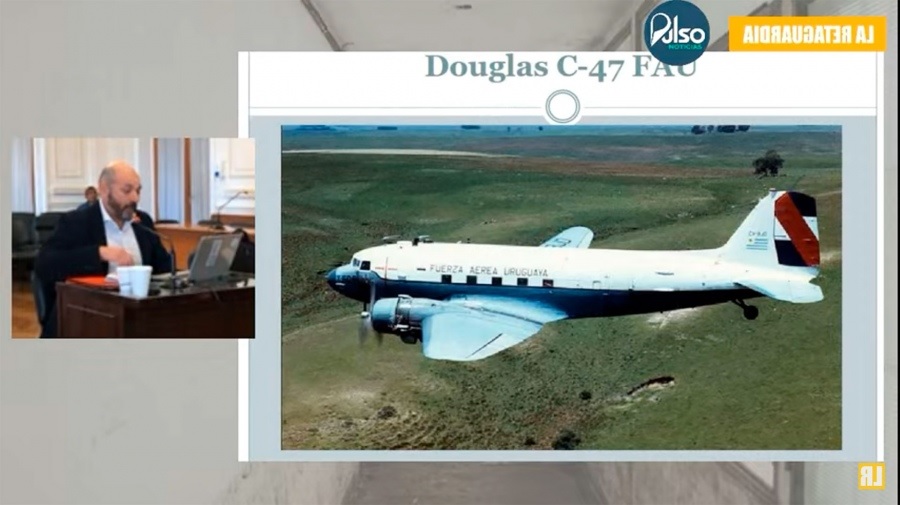A member of the Institute of Human Rights of Uruguay testified in the city of La Plata in the unified trial for the crimes committed against almost 500 victims held captive in three former clandestine centers and provided information on “clandestine flights with military crews” between both countries and requested collaboration to know what happened to several Uruguayan detainees who were interrogated by the military of that same nation.
He is Walter Washington Pernás Pereira, who testified today before the Federal Oral Court 1 of La Plata, which since October 2020 has been judging 16 repressors, among them the former police doctor Jorge Berges, for the crimes committed in the Pozo de Banfield, Pozo de Quilmes, and El Infierno, in Lanús.
The specialist explained that he is part of a team investigating what happened in Argentina with Uruguayan citizens during the dictatorship in that country and here.
“On September 18, 2019, a law was passed in the Uruguayan Parliament that obliged the Institute of Human Rights to search for those who disappeared in the framework of the dictatorship, and this team was formed that works with human sources, that is to say, we had to go out to look for testimonies of people who provide data that until now we do not have,” Pernás Pereira specified before the TOF 1.
In this sense, he remarked that it is “a race against time because we went out to look for people who have died”.
“The dictatorship in Uruguay ended in 1985, but there was no Trial to the Juntas as in Argentina, we had a law of expiration that slowed down our investigation”, he pointed out.
The Uruguayan researcher acknowledged that “we do not know if we will find remains of the disappeared, but we will reconstruct the truth”.
“Even during the pandemic, we conducted 120 interviews with military personnel, civilians, qualified witnesses, family members, relatives, and sources of context.
“We are following new lines of investigation for Uruguay”, he said enthusiastically and remarked that we are looking for information on “197 to 200 missing persons”.
He also said that in the data he has, “there comes a moment, between May 16 and 18, 1978, when they tell us ‘we stopped seeing the Uruguayans’ (in those former Argentinean clandestine centers), and there is no further explanation, or they allude that they were ‘transferred in clandestine flights’ to Uruguay, without us having documentary evidence to affirm it”.
“That is why I want to ask for help from the Courts, to access all the data from the Argentine courts. We are on the way to the truth”, he said.
Pernás Pereira explained the discovery of a “book of notes of the flights during the Uruguayan dictatorship”, which were made in Douglas C47 airplanes, and whose crew always included three Uruguayan military men.
He also provided information on the destination of those flights between one country and another: Carrasco air base, Ezeiza, Quilmes Aerodrome, El Palomar Airport, and an acronym indicating “unknown landing place”.
“Comparing the number of flights before and after the dictatorship, the increase in frequencies is eye-opening”, he pointed out and clarified that “it is partial information” about the type of flights that were carried out at that time.
Using films, he specified the flights between both countries between December 1977 and September 1979, highlighting that “after the closing of the clandestine centers of Pozo de Banfield and Pozo de Quilmes, the flights ended at the air base of El Palomar (in Uruguay), where a clandestine center operated”.
“I appreciate what is being done here (in this trial) to clarify these cases (of Uruguayans detained in these former centers) because the coordination between both countries is important.
“We need to unravel this situation not only from Uruguay”, expressed Pernás Pereira and said that “there are Argentine military men who keep silent about this situation that was cut off between May 16 and 20, 1978”.
In this line, he affirmed that “the Institution would like to see a focus on what happened with the Uruguayans because I understand the search for criminal responsibility, we are concerned with the reconstruction of the truth and the remains; and if something can collaborate we will be grateful”.
During this hearing, also testified Luis Armesto, who was kidnapped together with his father Julio, ex-deputy of Buenos Aires, in 1973, in the Pozo de Banfield, where both suffered torture.
“I made a promise long ago, which is why I am here. My father was very beaten, and I told him that whichever of the two came out alive, the first one to come out alive had to be in court to testify so that this would not happen again,” he said emotionally.
He remarked, “that is why I have this strength of will to come here; that is my internal motor.
I still do not understand, and I will say a phrase that a military man who was detained wrote in his book ‘My Testimony’, I am referring to Agustín Lanusse” and added that: “He said there are beings so aberrant and so low that if I had not met them, I would never have believed in their existence”.
“I say that phrase of Lanusse and to finish the phrase of prosecutor Strassera, Nunca Más (Never Again),” concluded Armesto.
The TOF 1, presided by Ricardo Basilico, is judging for the crimes committed in the Pozo de Banfield, the Pozo de Quilmes, and El Infierno, the former Minister of Government of Buenos Aires during the dictatorship, Jaime Smart; the former police doctor Jorge Antonio Berges and the defendants Federico Minicucci; Carlos María Romero Pavón, Roberto Balmaceda and Jorge Di Pasquale.
The trial of Guillermo Domínguez Matheu; Ricardo Fernández; Carlos Fontana; Emilio Herrero Anzorena; Carlos Hidalgo Garzón; Antonio Simón; Enrique Barré; Eduardo Samuel de Lío, and Alberto Condiotti has also begun.
With information from Telam


